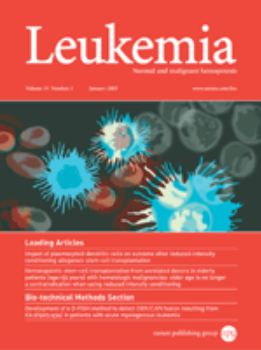Cohesin mutations in acute myeloid leukemia
IF 12.8
1区 医学
Q1 HEMATOLOGY
引用次数: 0
Abstract
The cohesin complex, encoded by SMC3, SMC1A, RAD21, and STAG2, is a critical regulator of DNA-looping and gene expression. Over a decade has passed since recurrent mutations affecting cohesin subunits were first identified in myeloid malignancies such as Acute Myeloid Leukemia (AML). Since that time there has been tremendous progress in our understanding of chromatin structure and cohesin biology, but critical questions remain because of the multiple critical functions the cohesin complex is responsible for. Recent findings have been particularly noteworthy with the identification of crosstalk between DNA-looping and chromatin domains, a deeper understanding of how cohesin establishes sister chromatid cohesion, a renewed interest in cohesin’s role for DNA damage response, and work demonstrating cohesin’s importance for Polycomb repression. Despite these exciting findings, the role of cohesin in normal hematopoiesis, and the precise mechanisms by which cohesin mutations promote cancer, remain poorly understood. This review discusses what is known about the role of cohesin in normal hematopoiesis, and how recent findings could shed light on the mechanisms through which cohesin mutations promote leukemic transformation. Important unanswered questions in the field, such as whether cohesin plays a role in HSC heterogeneity, and the mechanisms by which it regulates gene expression at a molecular level, will also be discussed. Particular attention will be given to the potential therapeutic vulnerabilities of leukemic cells with cohesin subunit mutations.


急性髓性白血病中的凝聚素突变
由 SMC3、SMC1A、RAD21 和 STAG2 编码的凝聚素复合体是 DNA 循环和基因表达的关键调节因子。自首次在急性髓性白血病(AML)等髓系恶性肿瘤中发现影响凝聚素亚基的复发性突变以来,十多年过去了。从那时起,我们对染色质结构和凝聚素生物学的认识取得了巨大进步,但由于凝聚素复合物具有多种关键功能,因此仍然存在一些关键问题。最近的研究成果尤其值得关注:DNA环路和染色质结构域之间的串扰被发现;人们对凝聚素如何建立姐妹染色单体内聚力有了更深入的了解;人们对凝聚素在 DNA 损伤反应中的作用重新产生了兴趣;还有研究证明了凝聚素对多聚酶抑制的重要性。尽管有这些令人兴奋的发现,但人们对凝聚素在正常造血过程中的作用以及凝聚素突变致癌的确切机制仍然知之甚少。本综述将讨论目前已知的凝聚素在正常造血过程中的作用,以及最新发现如何揭示凝聚素突变促进白血病转化的机制。此外,还将讨论该领域的重要未解之谜,如凝聚素是否在造血干细胞异质性中发挥作用,以及凝聚素在分子水平上调控基因表达的机制。还将特别关注具有凝聚素亚基突变的白血病细胞的潜在治疗弱点。
本文章由计算机程序翻译,如有差异,请以英文原文为准。
求助全文
约1分钟内获得全文
求助全文
来源期刊

Leukemia
医学-血液学
CiteScore
18.10
自引率
3.50%
发文量
270
审稿时长
3-6 weeks
期刊介绍:
Title: Leukemia
Journal Overview:
Publishes high-quality, peer-reviewed research
Covers all aspects of research and treatment of leukemia and allied diseases
Includes studies of normal hemopoiesis due to comparative relevance
Topics of Interest:
Oncogenes
Growth factors
Stem cells
Leukemia genomics
Cell cycle
Signal transduction
Molecular targets for therapy
And more
Content Types:
Original research articles
Reviews
Letters
Correspondence
Comments elaborating on significant advances and covering topical issues
 求助内容:
求助内容: 应助结果提醒方式:
应助结果提醒方式:


